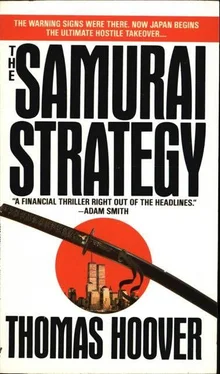Thomas Hoover - The samurai strategy
Здесь есть возможность читать онлайн «Thomas Hoover - The samurai strategy» весь текст электронной книги совершенно бесплатно (целиком полную версию без сокращений). В некоторых случаях можно слушать аудио, скачать через торрент в формате fb2 и присутствует краткое содержание. Жанр: Триллер, на английском языке. Описание произведения, (предисловие) а так же отзывы посетителей доступны на портале библиотеки ЛибКат.
- Название:The samurai strategy
- Автор:
- Жанр:
- Год:неизвестен
- ISBN:нет данных
- Рейтинг книги:5 / 5. Голосов: 1
-
Избранное:Добавить в избранное
- Отзывы:
-
Ваша оценка:
- 100
- 1
- 2
- 3
- 4
- 5
The samurai strategy: краткое содержание, описание и аннотация
Предлагаем к чтению аннотацию, описание, краткое содержание или предисловие (зависит от того, что написал сам автор книги «The samurai strategy»). Если вы не нашли необходимую информацию о книге — напишите в комментариях, мы постараемся отыскать её.
The samurai strategy — читать онлайн бесплатно полную книгу (весь текст) целиком
Ниже представлен текст книги, разбитый по страницам. Система сохранения места последней прочитанной страницы, позволяет с удобством читать онлайн бесплатно книгу «The samurai strategy», без необходимости каждый раз заново искать на чём Вы остановились. Поставьте закладку, и сможете в любой момент перейти на страницу, на которой закончили чтение.
Интервал:
Закладка:
"Before this conversation goes any further, I'd like a better idea of the kind of activity you're talking about. Selling Treasuries? Moving the funds into corporate bonds or munis? Commercial paper, equities."
"Sell?" He abruptly paused to watch as the staff began carefully assembling the weapons to take inside for the sale, and his mind seemed to wander. "You know, Mr. Walton, the sword always has held the greatest fascination for me. To make one of these, layers of steel of different hardnesses were hammered together like a sandwich, then reheated, hammered out, folded, again and again, until there were perhaps a million paper-thin layers." He pointed to one of the long blades now glistening in the light. "You cannot see it, of course, but they used a laminate of soft steel for the core, harder grades for the cutting edge. And whereas the edge was tempered quickly to preserve its sharpness, the core was made to cool very slowly, leaving it pliant." He suddenly smiled with what seemed embarrassment and turned back. "I take great inspiration from the sword, Mr. Walton. The man holding one must learn to meld with the spirit in the steel. He must become like it. What better than to meet the world with your hardest surface, yet maintain an inner flexibility, able to bend to circumstance as the need may arise?"
He stood a moment as though lost in some reverie then chuckled. "Sometimes I do tend to go on and on. I believe it was selling you asked about. The fact is you would not be actually selling Treasury obligations."
"Then what…?"
"Are you familiar with interest-rate futures?"
"Of course." The question was so unexpected I answered almost before I thought. Futures contracts were part of the big new game on Wall Street, although most of the action was still out in Chicago, places like the Merc and the Board of Trade, left over from the old days when farmers sold their crops in advance at an agreed-upon price. The farmer "sold" his grain harvest to a speculator while it was still nothing but green sprouts. He was worried the price might drop before he got it to market; the speculator was praying it would head up. The farmer, interestingly, was selling something he didn't yet have. But even if the price of wheat suddenly tanked, he was covered.
These days futures contracts were traded for all kinds of things whose value might change with time. High on that list were financial instruments such as Treasury notes and bonds, whose resale worth could drop if interest rates unexpectedly rose. If you owned a bond and were worried it might go down in value, you could hedge your exposure with a futures contract, in effect "selling" it in advance at the current price and letting somebody else assume the risk of future market uncertainty.
Modern finance being the marvel it is, you could even sell bonds you didn't own, just like the farmer's nonexistent grain. The Wall Street crowd called this a "naked" contract, since you were obligated to go out and acquire that bond in the open market on the day you'd agreed to deliver it, even if the price had skyrocketed in the meantime. Or you had to try and buy back the contract. Of course, you were betting that price would go down, letting you pocket the difference.
Pious spirits on the futures exchanges called these deals high finance and risk hedging. They operated, however, remarkably like legalized gambling. Dabbling in interest-rate futures was not for those with a dicey heart.
"Our objective," Noda went on, "is to cushion Japan's exposure somewhat."
"With futures contracts?"
"Precisely. U.S. Treasury obligations are held by a variety of investors in Japan, but up until now we have made very little use of the protection possible in your futures markets. Nippon, Inc. will concern itself with that."
I listened thoughtfully. "So you're saying you want to create an insurance program for Japanese investors in case the price of Treasuries weakens?"
It made sense. If interest rates went up here, reducing the value of their government paper, then the price of his futures contracts would rise to offset the loss.
I glanced over at Japan's monetary guru, Akira Mori, who was carefully examining her bronze fingernails. Was she the one behind all this sudden nervousness about America's financial health? What could these two know that we didn't, I wondered. It was all a bit mysterious.
One thing was no mystery, though. Whatever was going on with Matsuo Noda and Akira Mori gave me a very unsettled feeling.
"I'm flattered." I looked him over. "But afraid I'll have to pass. This fall I plan to take off for a while and… catch up on some personal matters that-"
"Mr. Walton," he cut in. "I would urge you not to lightly dismiss my proposal." He was staring back at me intensely. "I can only say for now that issues are involved… well, they encompass matters of grave international consequence." Another pause, followed by a noticeable hardening of tone. "Your other obligations cannot possibly be as important. It would be in your best interest to hear me out."
Want the truth? At that moment all my negative vibes about Matsuo Noda crystallized. He wasn't threatening me exactly. Or maybe he was. The large viewing room was all but empty now. Maybe he'd deliberately waited before getting down to his real agenda.
"My other 'obligations' happen to be very important to me just now."
"Then please consider rearranging them."
"Besides, my fees can be substantial." They weren't all that substantial, but I was looking to slow him down.
"Your fees do not present a problem." He continued, "This afternoon a retainer of one hundred thousand dollars was deposited in your personal account at Chase."
"What in hell…!"
"Money is of no consequence in this matter, Mr. Walton. Time is."
"You seem awfully sure I'll agree."
"We expect your involvement to begin immediately. I cannot stress too strongly the urgency of what you will undertake." He smiled thinly. "I also feel confident a man who enjoys a challenge as much as you do will find our undertaking… intellectually rewarding."
Seems I was hired and I hadn't even said yes.
This guy had another think coming. Besides, he could get anybody to do what he wanted. He didn't need me. As I stood there, I started trying to guess the dimensions of Matsuo Noda's financial hedge. Taken all together, Japan probably had roughly a hundred billion and change tied up in U.S. government paper. No way could he be thinking of covering more than a fraction of that. I knew plenty of law clerks who could do it, for godsake. A few phone calls to a couple of floor traders in Chicago…
"Look, the most I can do for you is recommend some very competent brokers I know to help you out. There shouldn't be too much to it. You'll just have to go easy. You can't hit the market makers in Chicago with too much action all at once. Prices get out of kilter. Then, too, there are exchange limits…"
"That is why we will be trading worldwide." Noda withdrew a folded sheet of paper from his breast pocket. "Perhaps you'd like to glance over our program. These are cumulative totals, which include our activity to date, but we will begin moving much more rapidly as soon as I've completed all the financial arrangements with our institutional managers at home. Perhaps you will see why we need a monetary professional."
I was still chewing on the "financial arrangements" part as I took the paper, opened it, and scanned the schedule of contracts. While I stood there, the room around us sort of blurred out. I had to sit down again. All his talk about samurai and nerves of steel was for real.
Matsuo Noda had a program underway to sell futures on a pile of U.S. Treasury bills, notes, and bonds he didn't own, "naked," in an amount I had trouble grasping. I knew one thing, though: if interest rates headed down, raising the value of those presold obligations, he'd be forced to cover awesome losses. He'd be in a financial pickle that would make Brazil look flush. On the other hand, if some disaster occurred and U.S. interest rates suddenly shot sky high…
Читать дальшеИнтервал:
Закладка:
Похожие книги на «The samurai strategy»
Представляем Вашему вниманию похожие книги на «The samurai strategy» списком для выбора. Мы отобрали схожую по названию и смыслу литературу в надежде предоставить читателям больше вариантов отыскать новые, интересные, ещё непрочитанные произведения.
Обсуждение, отзывы о книге «The samurai strategy» и просто собственные мнения читателей. Оставьте ваши комментарии, напишите, что Вы думаете о произведении, его смысле или главных героях. Укажите что конкретно понравилось, а что нет, и почему Вы так считаете.












